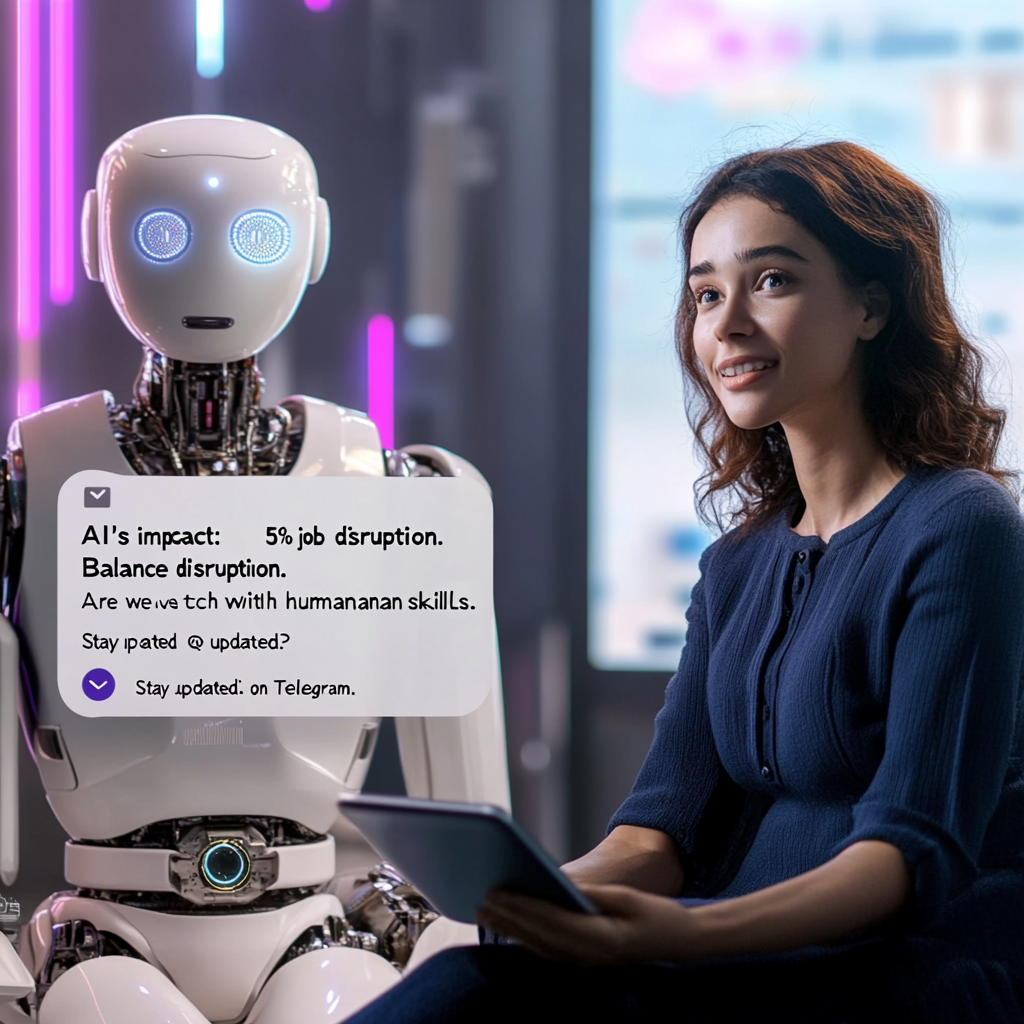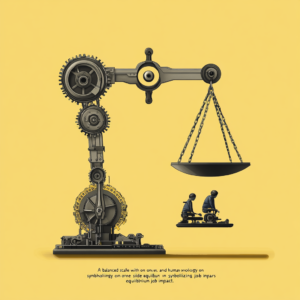
Economist Warns of Crash as AI Handles Limited Jobs
The AI Job Revolution: A 5% Reality Check
If there’s something that can make even the most stoic among us raise an eyebrow, it’s the recent claim from our friend Daron Acemoglu, an esteemed economist at MIT. Picture this: he sauntered into a Bloomberg interview and dropped the astonishing tidbit that AI might only snag a measly 5% of jobs in the coming decade. That’s a bold statement, and it’s making waves across the buzzing tech-savvy circles and boardrooms alike, reverberating with the faint echoes of disbelief and intrigue.
Now, hold your horses! This isn’t Acemoglu declaring that AI is a technological flop or suggesting we can kick back and ignore the innovations happening right under our noses. No, not at all! Instead, he’s offering a grounded perspective, urging us to peer through the tinted glasses of exuberance that often accompany discussions about artificial intelligence. Sure, AI shines in specific sectors—like coding and those delightfully complex webs of IT security—but when it comes to tasks demanding a robust level of human-like reasoning and reliability, well, let’s just say we’re looking at a bumpy ride. The bottom line? Residual human oversight is still the name of the game.
Let’s chew on this 5% figure for a moment. It may seem like a drop in the ocean, but if you whip out your calculator, you’ll see that we’re talking about a staggering number of jobs at risk—over 7 million in the United States alone. Reflect on that for a heartbeat. To put it into context, while less dramatic than the jaw-dropping unemployment figures we witnessed during the COVID-19 pandemic, this 5% could still be a game-changer in how we visualize the labor landscape. The question that lingers in the air like a stubborn cloud: are these job losses irretrievable? Can we put a safety net under the workforce that could tumble in the face of this AI wave?
Ah, but here comes the silver lining! There’s an emerging paradise for those well-versed in the language of AI. Roles such as AI programmers, integrators, and a whole spectrum of AI service-related jobs are blooming like wildflowers after a spring rain. But don’t break out the party hats just yet; while these positions are growing, they’re still a drop in the bucket compared to the vast ocean of jobs that are facing potential doom. The delicate dance between job losses and the creation of AI-related roles is, unfortunately, not exactly a tango.
Now, let’s pivot to the industrial and economic implications of Acemoglu’s assertions. People—particularly those buzzing about AI like bees around a flower—love to throw around the idea of exponential growth, comparing AI’s progression to the awe-inspiring impact of, say, electricity. But Acemoglu’s having none of that merry misconception. He shrewdly points out that the AI we’re currently gushing over has significant limitations, especially in areas like reliability and high-level reasoning. It’s not as simple as tossing more data or more compute power into the mix and magically conjuring a next-gen AI. Reality has a way of grounding our flamboyant metaphors, doesn’t it?
The stakes climb even higher when we delve into the economic and social concerns tied to AI’s integration into our workforce. Picture this: corporate giants wielding AI like a sword to chop away at wages, potentially stripping labor power and amplifying inequalities that already have society in a chokehold. Then there’s the threat of AI being exploited for misinformation, manipulation, and other ethically dubious escapades… it’s a scenario that makes one seriously reconsider the all-too-hasty embrace of this tech wonder.
As with most things in the grand circus of life, public and expert reactions to Acemoglu’s remarks have been a mixed bag—a veritable smorgasbord of opinions. Some scoff, insisting that his estimate is simply too cautious, predicting that the machines will storm the job market with far more ferocity than he suggests. Others nod appreciatively, recognizing the wisdom in taking a hard, realistic look at the trajectory laid before us. The chips are falling where they may, and retraining programs have become the urgent call to action for modern workers. It’s a sobering reminder that, despite the resplendent promises of technology, some things require methodical and strategic elevation rather than frantic rushes into the fray.
Now, let's get down to the nitty-gritty of why Acemoglu’s message is foundational rather than fatalistic. When he pushes for a realistic outlook on AI, it’s not about sounding the supposed death knell for progress; rather, it’s an imperative for us to ground our expectations in reality. The frenzy surrounding AI can easily snowball into a blizzard of unrealistic anticipations, leading us headlong into misguided economic decisions. Trust me when I say that a balanced understanding of AI’s position in the workforce isn’t merely an academic exercise—it’s a necessity for sustainable development and intelligent investment.
In conclusion, let’s take a moment to reflect on the path ahead. As we navigate this complex intersection of AI and jobs, it’s paramount to embrace a balanced perspective drenched in reality. Sure, AI has the potential to usher in a new era within selected sectors, but let’s not kid ourselves into thinking it’s ready to sweep the entire human workforce under its digital rug. Rather than seeing AI as the enemy or as a solely problem-solving deity, we should focus on weaving it into our labor fabric in a way that complements human ingenuity rather than overshadowing it.
So, what’s next? Want to stay up to date with the latest news on AI and its economic implications? Subscribe to our Telegram channel: @channel_neirotoken
Remember, the future of work is not just a tale of advancing technology; it’s a narrative about our choices and how we harness this transformative force. Let’s steer this ship wisely, ensuring that AI enhances our existence rather than disrupting the harmonious fabric of our society.

